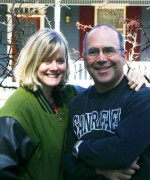Column Name
Title
Born in Detroit, Joseph Alessi grew up in San Rafael, Calif., and attended the Curtis Institute in Philadelphia, where he earned a diploma in trombone. He has also taught at Temple University, Grand Teton Music Festival, Manhattan School of Music, and Mannes College of Music. He has been principal trombonist of the New York Philharmonic since 1985, and a Juilliard faculty member since 1986.
Body
When did you first know you wanted to be a musician?
I was always interested in music because of my parents. My father was a trumpet player at the Metropolitan Opera, where he met my mother, Maria, who was a lyric soprano. I entered a competition sponsored by Pepsi-Cola when I was 14 and was the winner in the brass division, and that spurred my enthusiasm and confidence. Incidentally, the piano winner that same year was Jeffrey Kahane. I also remember playing “Billy Boy” for my third-grade class. This was my first public performance. People applauded, and I liked that.
Who was the teacher or mentor who most inspired you?
My father. He taught me that if you want to get anywhere in the music business, you must do your talking through your instrument and not through your mouth. Also, he taught me how important fundamentals are, and how to be disciplined about your practicing.
What was the first recording that you remember hearing or buying?
I was not sure about whether the trombone was “it” for me, to be honest. I had a great interest in the trumpet. However, when I bought my first J.J. Johnson recordings, I knew the trombone could be an expressive instrument. The Chicago Symphony Low Brass educational recording was also inspiring; I learned the role of the low brass in a symphony orchestra from this legendary group.
What’s the most embarrassing moment you’ve had as a performer?
There was one concert where Leonard Bernstein was conducting Mahler’s Second Symphony and I got stuck in huge traffic in New Jersey. I dumped the car on a side street and thought I could run across the George Washington Bridge. It turned out to be a mile or so across, and then when I got onto the subway, the A train pulled out of the station and then stopped for 10 minutes. I was frantic. When I finally made it to Avery Fisher Hall, I thought I would hear the Mahler over the P.A. system, but I heard nothing. Bernstein and the orchestra were waiting for me onstage and I had to walk in and take my seat in front of the whole audience.
If you could have your students visit any place in the world, where would it be, and why?
Italy. The tremendous wealth of art, music, opera, architecture, and history to explore—not to mention the great food—would be the experience of a lifetime for them.
What are your non-music related interests or hobbies?
I love to play a round of golf now and then in my free time. I have broken 90—but of course, this was only one time. I love model railroading. Also, I am a pretty good water skier.
If your students could only remember one thing from your teaching, what would you want it to be? And how has your teaching changed over the years?
Maybe that Alessi was intense and demanding, but that he wanted us to be the best and was tough on us for that reason only. Over the years, I have continued to do this, but I also know now that certain students require a different approach. Not all students react well to the same methods.
What is your favorite thing about New York City?
You can find the best of the best right here in New York.
If you weren’t in the career you are in, what would you be doing?
Probably driving a truck.





